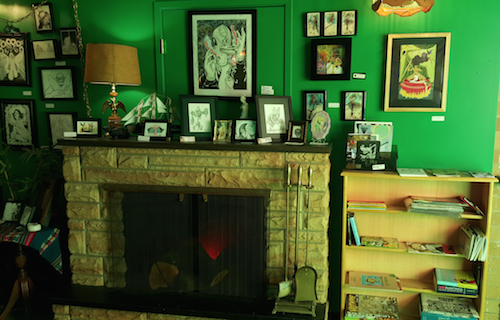Push/Pull gives a home to artists who feel underrepresented

Maxx Follis originally created the space that would become Push/Pull at Echo Echo, a collective gallery in Greenwood. She always intended for Push/Pull to be a cooperative space with artists acting as members, but her first call for members only delivered one artist — cartoonist Seth Goodkind. “So when it started out it was just the two of us trying to fill four walls of art” every month or so for a new show, she explains.
Soon, Follis and Goodkind realized that they needed to build a community if they wanted their gallery to take off, because “we couldn’t just make art all the time.” She pauses and corrects herself. “We couldn’t make good art all the time. You can make art all the time,” she says, but if all you’re doing is running on a treadmill, you begin to sacrifice quality at the altar of quantity.
After a long search for space and a successful Kickstarter, Push/Pull opened two months ago in their new home at 5484 Shilshole Ave NW with seven contributing artists as members. (“I’m almost done sending out all of the [Kickstarter] rewards,” Follis tells me. How was crowdfunding for her? “It was totally crazy and I wouldn’t recommend it to, really, anyone, but I definitely think I would do it again.”) Over the course of the space’s development, Follis says, “comics became one of our main focuses.”
Push/Pull is much more illustration-centric than most of the galleries in town, which focus more on so-called “fine art.” Follis says there’s a definite prejudice in the art world against illustration; “fine artists don’t realize how much work goes into drawing,” she says.
And now as illustrators come to Push/Pull events and start to hang out with cartoonists, Follis says, the lines between those disciplines are blurring. “It’s funny how many [illustrators] don’t do comics and then they start to hang around with these cartoonists and all of a sudden they’ll come out with a mini[comic].” She says people who have only drawn static illustrations are starting to think to themselves: “I can do something more than just make a piece. I can create a story.”
The work ethic of cartooning plays right into Push/Pull’s aesthetic theory of abundance. “The reason that the artist/illustrator/cartoonist tends to be a good fit for us,” Follis says, “is that people who do comics are compelled to tell stories, so they already have a drive and they tend to work well for us because they want to make art all the time.”
All of the art and comics at Push/Pull are sold on commission, and Follis claims that they offer some of the best rates in town — the artists keep 75 percent of sales. Push/Pull pays regularly, too, which leaves some cartoonists in a state of shock. They’re treating artists who generally don’t enjoy a whole lot of respect as professionals who are worthy of attention.
“We have artists that specifically come to us because no other gallery in Seattle will show them,” Follis says. “And we like that.”